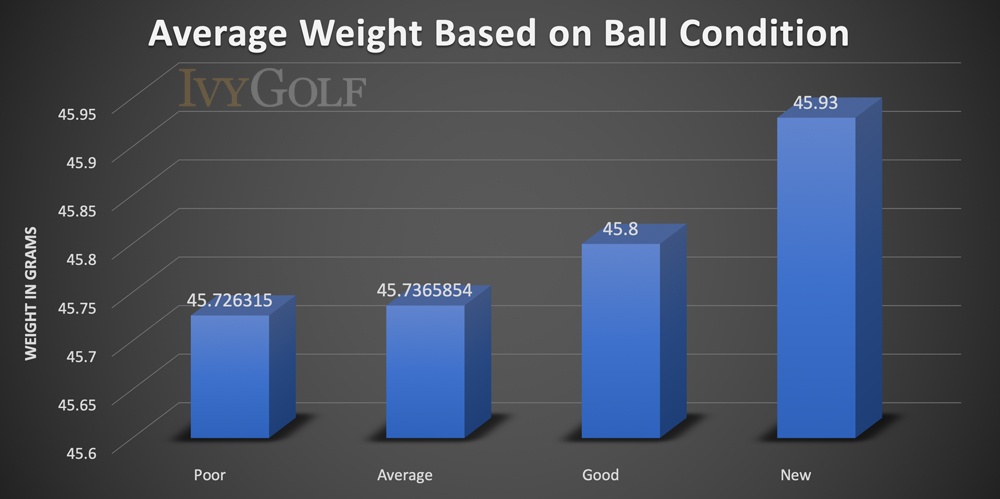A golf ball typically weighs approximately 45-46 grams. Golf balls are designed to be aerodynamic and have a regulated weight for consistency during play.
The weight of a golf ball contributes to its flight and distance capabilities when struck by a golf club. Playing golf requires precision and skills, including controlling the weight and speed of the golf ball. An average golf ball weighs around 45-46 grams, although the exact weight may vary slightly depending on the specific manufacturer and model.
The weight of a golf ball is regulated by professional golf associations to ensure fair and consistent play. This weight is crucial in determining the ball’s flight trajectory, distance, and overall performance when hit by a golf club. We will explore in more detail how the weight of a golf ball influences its performance on the golf course.

Credit: www.amazon.com
Why Golf Balls Come In Different Weights
Golf balls may seem like simple and uniform objects, but they actually come in a variety of weights. The reason behind this lies in the intricacies of golf ball design and the impact that weight has on performance. Understanding why golf balls come in different weights can help you make informed decisions when choosing the right ball for your game.
Evolution Of Golf Ball Design And Materials
The world of golf ball design has come a long way since the early days of the game. From the wooden balls of the past to the modern high-performance balls of today, there have been significant advancements in materials and construction that have contributed to the varying weights of golf balls.
Factors Influencing The Weight Of Golf Balls
The weight of a golf ball is influenced by several key factors, including:
- Core materials and construction
- Compression rating and its impact on weight
- Dimple patterns and aerodynamics
- Cover materials and thickness
Core Materials And Construction
The core of a golf ball plays a crucial role in its overall weight. Different materials, such as rubber or synthetic compounds, can be used to create the core. The size and density of the core also affect the weight of the ball.
Compression Rating And Its Impact On Weight
Compression rating refers to the firmness of the golf ball, which can impact its weight. Higher compression balls tend to have a denser construction, resulting in a heavier weight.
Dimple Patterns And Aerodynamics
The dimple patterns on a golf ball are designed to optimize its aerodynamics and lift. These dimples can affect the weight distribution of the ball, which ultimately impacts its overall weight.
Cover Materials And Thickness
The cover of a golf ball can be made from various materials, such as urethane or ionomer. The thickness of the cover also plays a role in the weight of the ball. A thicker cover generally leads to a heavier ball.
How Weight Affects Golf Ball Performance
The weight of a golf ball can have a significant impact on its performance in various aspects of the game. Key factors affected by weight include:
- Distance and trajectory
- Spin control and feel
- Durability and impact resistance
The Standard Weight Range For Golf Balls
Golf balls are typically manufactured within a standard weight range, which is regulated by governing bodies such as the USGA and the R&A. This ensures fairness and consistency in gameplay.
Variations In Weight Across Different Golf Ball Types And Brands
While there is a standard weight range, variations can still occur across different types and brands of golf balls. Manufacturers may tweak the weight of a ball to achieve specific performance characteristics.
The Impact Of Weight On Player Performance
The weight of a golf ball can directly affect a player’s performance, especially when it comes to swing speed. A heavier ball may require more energy to achieve the desired distance, while a lighter ball may allow for a faster swing speed.
Choosing The Right Ball Weight For Your Game
When selecting a golf ball, it’s essential to consider your own swing speed and playing style. Experimenting with different ball weights can help you find the right balance between distance, feel, and control.
Frequently Asked Questions For How Heavy Is A Golf Ball
How Many Golf Balls Weigh 1 Pound?
About three golf balls weigh approximately 1 pound.
How Heavy Is A Gold Ball?
A gold ball typically weighs about 1 kilogram or 2. 2 pounds.
What Is The Mass Of A Golf Ball?
The mass of a golf ball is approximately 45 grams.
Are Golf Balls Heavy Or Light?
Golf balls can be both heavy and light, as they come in varying weights.
How Heavy Is A Golf Ball?
A standard golf ball weighs around 1. 62 ounces or 45. 93 grams. However, some golf balls may vary slightly in weight.
What Are The Materials Used In A Golf Ball?
Golf balls are typically made of a solid rubber core surrounded by a layer of synthetic resin or thermoplastic materials, with a durable outer cover made of urethane or surlyn.
How Does The Weight Of A Golf Ball Affect Performance?
The weight of a golf ball can impact its flight and distance. Heavier golf balls may have more distance due to increased momentum, while lighter golf balls may have better control and accuracy.
Conclusion
To sum up, the weight of a golf ball typically ranges between 1. 62 and 1. 68 ounces or 45. 9 and 47. 6 grams. Understanding the weight of a golf ball is crucial for players as it affects its flight and distance.
Whether you’re a beginner or a seasoned golfer, knowing the weight of your golf ball can make a significant difference in your game. So, next time you step onto the golf course, keep in mind the importance of a well-weighted golf ball.
Happy golfing!

